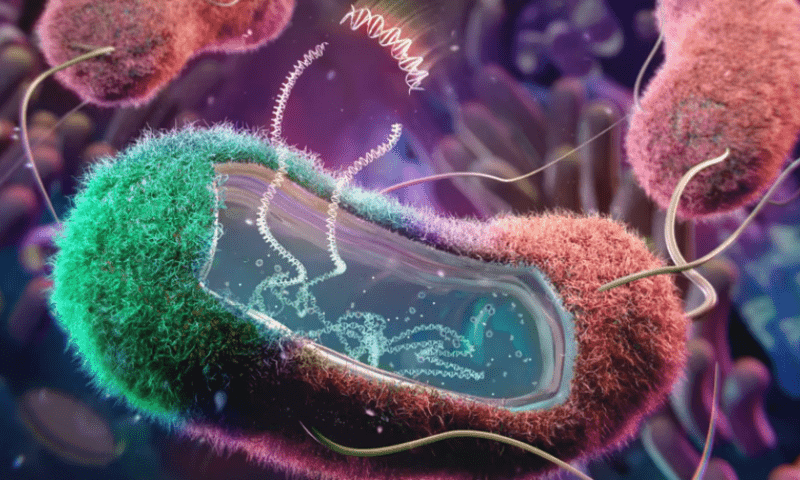Because the gut microbiome affects various aspects of human health such as metabolism and immunity over time, scientists have been trying to plant engineered bacteria to treat chronic diseases. But the stable composition of the gut microbial community makes introduction of foreign bacteria-based therapeutics challenging.
Now, scientists at the University of California, San Diego have identified a native gut bacterial strain of Escherichia coli that’s amenable to genetic modification. In a new study published in Cell, the team showed that native E. coli engineered to deliver specific genes can have long-term systemic effects in host mice, including ameliorating diabetes.
“Bacteria in our body are adapted to each one of us specifically: the kind of foods we eat, the common stresses our body experiences or induces, and our genetic background,” Amir Zarrinpar, M.D., Ph.D., the study’s corresponding author, explained in a statement. So native bacteria collected from the host are ideal candidates as therapeutics.
Instead of bacteria cultured in lab dishes, the UCSD researchers extracted the E. coli strain directly from a mouse and altered the bacteria to express two different genes. The first one expressed bile salt hydrolase (BSH), which can potentially affect host metabolic activity. The other one carried IL-10, an anti-inflammatory agent, which had previously been piggybacked on probiotics in preclinical colitis models.
By way of a feeding tube, the engineered E. coli persistently colonized all mice for the life of the animals in a non-sterile facility, whereas traditional lab-cultured bacteria were gone over time.
The team further evaluated the BSH-edited E. coli because the gene’s functions are well-established. BSH could induce bile acid changes, which could affect multiple metabolic systems, including glucose, fat and heat product, as well as immunity, the team noted.
After confirming the bacteria can stably express BSH throughout the entire gut of the mice to influence bile acids, the scientists went on to show that mice on a normal chow diet that got the BSH-edited bacteria had reduced blood glucose and insulin levels after being challenged with a mixed meal test. The results suggest the mice had improved insulin sensitivity and glucose tolerance, the team said.
To further evaluate whether the modified bacteria can treat disease, the scientists used them in a genetic mouse model of Type 2 diabetes with obesity. While the bacteria didn’t reduce weight, mice that got the engineered native bacteria showed significant improvements in insulin sensitivity compared with control more than three months after a single treatment.
The findings also appeared to have translational potential in humans. In their study, the UCSD scientists also isolated E. coli from human biopsies of the gastrointestinal tract and successfully manipulated all 10 of the bacteria strains.
“Further studies are necessary to determine whether the autologous transfer of engineered native bacteria can lead to long-lasting colonization of a human host and treatment of long-standing chronic conditions and genetic diseases,” the scientists wrote in the study.
Gut microbiomes as therapeutics have gained traction lately. Biotechs like Seres Therapeutics and MaaT Pharma have recently reported promising data in infections and cancer. Large pharma companies like Takeda and Merck have also embarked on the search for microbiome drugs.
But the field has also had its fair share of setbacks, including lately from Kaleido Therapeutics, Finch Therapeutics, Vedanta Biosciences and 4D Pharma.
On the academic side, a team led by Sean Davies, Ph.D., at Vanderbilt University has been exploring the anti-obesity potential of gut microbiome engineered to produce a type of lipid called NAPE. Researchers at Baylor College of Medicine previously found that the probiotic Limosilactobacillus reuteri holds potential to treat some symptoms caused by neurological disorders.
UCSD’s Zarrinpar also envisions their findings on E. coli might one day be applied to more diseases. “We are dreaming big,” Zarrinpar said. “This technology is something that can potentially open up the application of the microbiome therapy to influence so many different chronic and genetic diseases.”

